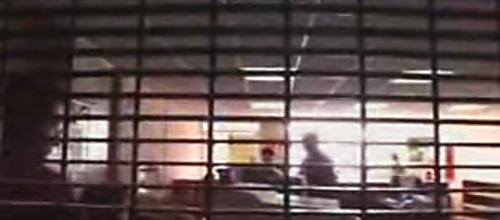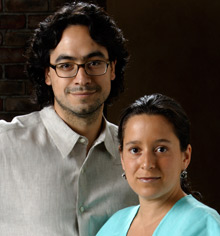 A Mexican defendant peers out on his trial proceedings. (From "El Túnel") |
Two lawyers with cameras help rehabilitate Mexican 'justice'
| 01 December 2008
BERKELEY — Shortly before leaving Mexico City to begin graduate work at UC Berkeley in 2006, lawyers Layda Negrete and Roberto Hernández got a desperate phone call. The couple had become well known for their efforts to reform their country's criminal-justice system, where trials are not public and the accused are not assumed to be innocent. Now, a breakdancer and street vendor named Antonio "Toño" Zúñiga was on the phone, pleading for their help. He'd been arrested and charged with first-degree murder. Zúñiga claimed, and the facts suggested, that he had nothing to do with the crime.
As planned, Hernández and Negrete left for Berkeley to study for PhDs in public policy. But not before agreeing to look into the case, which soon took a turn worthy of a TV cop drama. In the Boalt law library, while examining a document from the young man's file, Hernández intuited (correctly, it turned out) that the "defense lawyer" had forged his license. When Zúñiga was later convicted (with a 20-year sentence), they won a retrial based on this fortuitous discovery.
Remarkably, the young "lawyers with cameras," as they call themselves, also were granted permission to film the judicial retrial in a Mexico City courtroom. "We got access to the court with four cameras…. It was a miracle!" says Negrete. "And then we did interviews with all the witnesses."
They used the footage, eventually, to make a 90-minute documentary revealing standard practices in Mexico's courts and prisons. In "Presumed Guilty" — a "side project" as they earn their PhDs and raise their five-year-old daughter — Hernández and Negrete, who are both in their thirties, tell the remarkable story of the tribulations of one man, and of the deeply flawed system in which he became ensnared. In Mexico, says Hernández, "there is no constitutional or appellate remedy for most basic due-process violations. In the rare event that a trial is nullified, you get a retrial with the same judge who may have already convicted you. One could say that 'Presumed Guilty' is a story about our struggle against those odds."
Shot and produced with support from non-profit organizations in Mexico, the U.S., and Europe, the new film debuted at the 21st International Documentary Film Festival, in Amsterdam, in late November (where it received high marks from the audience).
Ringside views of trial procedures
 Roberto Hernández and Layda Negrete. (Bill Schwob photo) |
When they met seven years ago, Negrete was doing research for a prestigious Mexican think tank, Hernández for a U.S. organization that supports judicial reform. Their work afforded them inside access to the court system — otherwise off-limits to the Mexican public — and they began to compare notes about stranger-than-fiction moments to which they were witness.
Mexico's 90-percent criminal-conviction rate, they learned, rests atop a mountain of policies and procedures that favor the prosecution. Negrete notes that even the architecture of the judicial system favors a "guilty" verdict. Criminal courts are physically attached to prisons. When it's time to go to trial (three months in pre-trial detention is average, they say), the defendant navigates an underground tunnel to a small room separated from the courtroom by bars. It's from there, dressed in prison garb, that the defendant literally "stands" trial, sometimes for six or seven hours at a stretch, with no chair and no access to a bathroom, in the stench left by those before them who have had to relieve themselves on site.
Often a prosecutor is attached to a court and litigates each and every case that comes before it — developing, in the process, a close relationship with both the public defender and the judge. On one occasion the researchers were invited to celebrate a prosecutor's birthday, and everyone, the judge included, gathered around the cake to sing. "No, this can't be possible!" Negrete recalls thinking, as she watched the defendant look on from his "little hole" at the edge of the room.
The two lawyers' quantitative research, meanwhile, yielded "data points" such as these: from a random sample of 1,500 defendants, roughly 80 percent said they had never seen a judge; 60 percent said that they either couldn't hear or couldn't understand all or most of their own trial proceedings.
"We were proud of our numbers," recalls Negrete, as the research data made a strong case for reform. Or so they believed. The powers that be remained unmoved. For Negrete and Hernández, it was time to take another tack. "We sold our car and bought a camera," recalls Negrete. "We decided to make a movie." They began to visit Mexican jails, "hunting for small anecdotes that would back up our statistics."
Mobilizing support
Layda Negrete on why she is studying public policy at UC Berkeley
'We were sure that we needed more training to develop serious social science and policy research. Legal training does not provide this training at all….
'Now I feel we are much more competent to work in teams with social scientists. I feel [I have] a more powerful mind and that I am closer to understanding the chaotic Mexican institutions with something more than rhetoric and poetry.'
When they found those stories — Zúñiga's most notably — they used them to bring attention to a growing national campaign for judicial reform. Hernandez was invited to Chile to observe the judicial reform it had instituted after the fall of the Pinochet dictatorship. "It was the most successful in Latin America," notes Negrete. "It had momentum and brains and money."
Working with a national network of judicial-reform activists, they made presentations to Mexico's movers and shakers (using video on Chilean reforms as a point of contrast), were interviewed on CNN's Spanish-language channel, and uploaded to YouTube an initial video, a 20-minute documentary "El Túnel" (which so far has received more than 50,000 "views"). "Roberto, I was speechless, my throat closed up, my heart hurt, I let out a cry, … but this video is worth the world in gold," one viewer responded in Spanish on the website's comment section.
This June, Mexican President Felipe Calderón signed a constitutional
amendment for sweeping judicial reforms, which Negrete describes
as "a
very strange combination of Patriot Act and very liberal
human-rights pieces." Hernández was instrumental in the
incorporation of the latter elements — borrowing language from
international agreements to which Mexico was signatory, and
then working through Negrete's mother, who is a member of
the Mexican Congress, to move the language through key committees.
With the new amendment, Mexico, for the first time, is to
have public trials and a presumption of innocence.
"Is it not unbelievable," he asks, "that
inserting presumption of innocence into our constitution
was, still in 2008, a matter of huge controversy?" Now the
challenge, Hernández
believes, is to implement the amendment's due-process procedures
throughout the land. "I do not believe people understand
presumption of innocence yet," he says.


